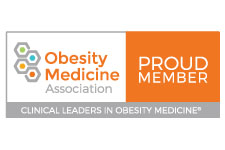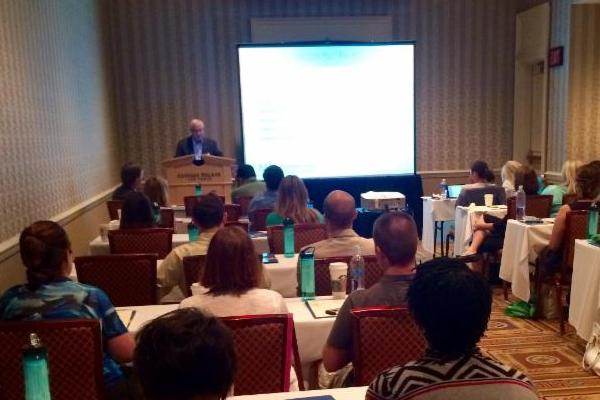 OMA earns highest level of AOA accreditation
At the end of 2014, OMA was awarded one-year Category 1 CME sponsor accreditation by the American Osteopathic Association (AOA). We then underwent an intensive audit, where AOA looked at our CME practices, procedures, and results. The audit earned 100 out of 100 possible points, which means that the AOA granted OMA the highest possible level of accreditation: three-year Category 1 CME sponsor accreditation. This accreditation will help with OMA's ongoing commitment to educating more DOs about obesity medicine. |
 Proudly display your membership in OMA
The member badge artwork is now available. Use the member badge artwork on your website or in your email signature to show your patients and colleagues that you're a proud member of OMA, the largest organization of clinicians dedicated to preventing, treating, and reversing the disease of obesity. Log in to your OMA account to get the HTML code for the member badge artwork. |
 Updated Obesity Algorithm expected in January of 2016
The Obesity Algorithm is among OMA's top educational resources about obesity medicine. The authors of the algorithm are in the final stages of reviewing the new version, which is expected to be released in early January. Updates in the 2016 version of the algorithm include expanded sections about nutrition and bariatric surgery. The current algorithm is available to download for free online at ObesityAlgorithm.org. |
 Support the foundation on Giving Tuesday
While Black Friday and Cyber Monday focus on buying, Giving Tuesday focuses on giving back and showing your appreciation for nonprofit organizations. This Giving Tuesday, choose to support obesity research that advances the prevention, reduction, and reversal of obesity by making a charitable donation to the Obesity Treatment Foundation. Any donations made to the foundation are tax-deductible. Give a gift to the foundation online now. |
 |
Pharmacotherapy in conjunction with a diet and exercise program for the treatment of weight recidivism or weight-loss plateau post-bariatric surgery: A retrospective review
Schwartz, J., et al. Obes Surg, 2015.
The usefulness of prescribing phentermine or phentermine-topiramate in addition to diet and exercise was evaluated in patients who had undergone bariatric surgery and gained weight back or plateaued in their weight loss. Patients included in the analysis had either Roux-en-Y gastric bypass (RYGB) or laparoscopic adjustable gastric banding (LAGB) and were treated with phentermine or phentermine-topiramate. Patient weights were examined 90 days after the initial surgery following medication use. The retrospective analysis found that patients on phentermine lost 6.35 kilograms (kg) (12.8 percent excess weight loss), and those prescribed phentermine-topiramate lost 3.81 kg (12.9 percent excess weight loss). No serious side effects were reported. These data suggest that phentermine and phentermine-topiramate, in addition to diet and exercise, may be helpful for weight loss in post-RYGB and post-LAGB patients. View article
|
Greater hunger and less restraint predict weight-loss success with phentermine treatment
Thomas, E. A., et al. Obesity, 2015.
Phentermine is widely prescribed among obesity medicine specialists. A study was conducted to test predictors of success in losing weight with phentermine treatment. This pilot study treated patients with phentermine for eight weeks and evaluated appetite and eating behaviors using the three-factor eating questionnaire and appetite ratings. The study found that individuals who had greater hunger and less restraint were more likely to lose a significant amount of weight with phentermine. This information may be helpful when determining which patients might benefit most from phentermine treatment. View article
|
New insights into the variable effectiveness of levothyroxine monotherapy for hypothyroidism
McAninch, E. A., and Bianco, A. C. Lancet Diabetes Endocrinology, 2015.
Thyroid hormone replacement has been the go-to treatment for hypothyroidism since the 19th century. This comment paper from the Lancet points out that treatment for hypothyroidism with T4 alone may not be appropriate for all patients. Many obesity medicine specialists may have noticed that this is especially true for patients with obesity. The paper points out the need for future investigations on the clinical significance of a low-serum T3 concentration or high T4:T3 ratio, as levothyroxine monotherapy does not normalize serum T3 in patients with normal serum TSH concentrations. View article
|
|
|
*These events are hosted by organizations other than OMA. Contact the organization directly for details.
|
|
Answered by Dr. Harold Bays
Q: If you decide to incorporate pharmacotherapy into a patient's treatment plan, how do you decide which anti-obesity medication to try first?
A: The pharmacotherapy of first choice should be based upon the individual presentation of the patient; the safety and efficacy of the drug; and the potential for tolerability issues, drug interactions, and drug metabolism.
|
|
Executive Director
Sponsorships and Exhibits Manager
Operations Manager
Education Coordinator
Communication Manager
Executive Director of the Obesity Treatment Foundation
|
|
101 University Blvd.,
Suite 330
Denver, CO 80206
|
|
 |
|
 Obesity Medicine 2016
This spring we're headed to San Francisco for Obesity Medicine 2016, your leading resource for certification exam review and the premiere source of education about managing an obesity medicine clinic, nutrition, and the comprehensive approach to obesity treatment. Build your schedule* to include the courses that most interest you, and earn up to 30 CME/CE. |
Review Course for the ABOM Exam
13 CME/CE | April 6-7
Helps prepare those planning to take the American Board of Obesity Medicine (ABOM) certification exam.
| Practice Management Essentials
6.5 CME/CE | April 6
Explains the best business practices for running an obesity medicine clinic, from setting up a practice to boosting patient retention.
|
|
Nutrition Course
6.5 CME/CE | April 7
Outlines the latest evidence-based findings about nutrition and helps you select appropriate nutrition plans for your patients.
| Spring Obesity Summit
17 CME/CE | April 8-10
Addresses topics related to current and emerging research, evidence-based treatment approaches, technologies, and practical methods used by obesity medicine clinicians.
|
|
|
*The Review Course for the ABOM Exam runs concurrently with Practice Management Essentials on Wednesday and the Nutrition Course on Thursday. Registration for the Review Course includes two days of class time, and switching between courses is not allowed.
|
 Obesity Medicine Basics
This one-day course provides introductory-level training about the evaluation and treatment of patients affected by obesity. Refer a colleague to a course in their area and allow us to introduce them to obesity medicine. Learn more about this course. Course dates and cities:- Jan. 16 | Indianapolis
- Jan. 23 | New Orleans
- Jan. 30 | Philadelphia
- Feb. 20 | Raleigh
- Feb. 27 | San Diego
- July 16 | Houston
- July 30 | Minneapolis
- Aug. 13 | Orlando
|
|
|
|
The Obesity Medicine Association and the Obesity Treatment Foundation thank our 2015 Corporate Advisory Council members for their continuous support.
|
© 2015 Obesity Medicine Association. All rights reserved. Materials may not be reproduced, redistributed or translated without written permission. Advertising disclaimer: Under a policy approved by the OMA executive committee and exhibitor/advertiser review committee, commercial companies may apply to advertise in OMA publications. Approval does not imply endorsement or official recognition of particular products or services.
|
|
|
|